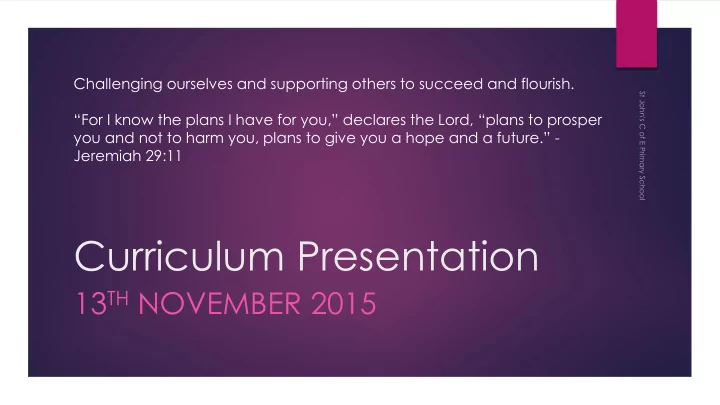

Challenging ourselves and supporting others to succeed and flourish. “For I know the plans I have for you,” declares the Lord, “plans to prosper you and not to harm you, plans to give you a hope and a future.” - Jeremiah 29:11 Curriculum Presentation 13 TH NOVEMBER 2015
Aims: Early Years Foundation Stage (EYFS) New National Curriculum Years 1 – 6 Assessment
EYFS Curriculum 7 Areas of Learning and Development Personal, Social and Emotional Development Physical Development Communication and Language Literacy Mathematics Understanding the World Expressive Arts and Design http://www.stjohns-canterbury.kent.sch.uk/early-years
New National Curriculum Ramped up curriculum for English and Maths. Programmes of study reduced to allow more flexibility and creativity for teachers. History is taught in chronological order. Emphasis on knowing geographical facts. ICT has become Computing (includes coding).
English - Writing English is taught through our Topic and high quality texts. Focus on Spelling, Punctuation and Grammar. No Nonsense spelling programme. Each child has an individual writing ladder to ensure they know their individual writing target. Handwriting is practised daily. Teachers plan daily writing opportunities and at least one extended piece of independent writing a week.
English – Reading and Phonics Phonics is taught daily in a structured and systematic way. When children are ready they move on to the spelling programme. Reading is planned for daily: - KS1 – ‘Book Talk’ - KS2 – Guided Reading - 1:1 reading opportunities - Weekly use of the school library
Maths School Calculation Policy - http://www.stjohns- canterbury.kent.sch.uk/policies/calculation-policy Use of manipulatives Using and applying, reasoning and problem-solving RAPID/ARM Resources – Busy Ant Maths, nrich, Hamilton Trust, SPEAR maths, mathletics Cross-curricular maths
Science We are planning from the new Kent Scheme of Work for Science, written by Andrew Berry (former KCC Primary Science Advisor). Year Term 1 Term 2 Term 3 Term 4 Term 5 1 Animals Seasonal Changes Everyday Materials Seasonal Changes Plants 1 2 2 Living Things & their Plants Animals Everyday Materials SATS Habitats 3 Plants Animals Rocks Light Forces & Magnets 4 Living Things & their States of Matter Animals Sound Electricity Habitats 5 Living Things & their Animals Materials – Earth & Space Forces Habitats Properties/Change s 6 Living Things & their Animals Evolution & Light Electricity Habitats Inheritance
Topics based on pupil and staff voice. http://www.stjohns-canterbury.kent.sch.uk/curriculum-progression- sheet-0 Year Term 1 Term 2 Term 3 Term 4 Term 5 Term 6 Nursery Ourselves Remaining topics based on pupils interests All About Me Traditional People Who Fantasy Under the Sea Dinosaurs Reception Tales Help Us St John's and Wild Weather Toys (Old and Percy the Percy the 1 Canterbury me New) Park Keeper Park Keeper Caring about Castles, Great Fire of Island 2 others/Superh Explorers Explorers Queens and London Adventures eroes Kings Food Glorious Exciting Exciting 3 Stone Age Iron Age Patterns Food Egyptians Egyptians Raging Rivers Raging Rivers Volcanoes and and Rotten Rotten 4 Anglo-Saxons and Monstrous Monstrous Romans Romans Earthquakes Mountains Mountains America Groovy Groovy Vicious 5 (Native Around Kent Around Kent Greeks Greeks Vikings Americans) Crime & Crime & 6 Aztecs Eco Crew Dragons Den Dragons Den Punishment Punishment
Planning Hook/impact day – creative start to engage and motivate children. Key questions – investigate/research/pupil-led. Trips, visits, real life experiences, use of the local area – making learning meaningful and purposeful. Planned outcomes/WOW end – a celebration of learning (Parent invitation).
Other subject areas taught: Religious Education is taught weekly – we follow the Diocese plans. PE – two sessions a week, teachers are supported by coaches from Premier Sports. Computing – (Study Zone, Chris Thomas). Modern Foreign Languages. Geography, History, Art, DT, Music (Progression of Skills).
Assessment End of Key Stage Assessments (Year 2 and Year 6) SATs. Levels have been removed – replaced with ‘Age - Expected’ ‘Secondary ready’. St John’s have moved to ‘Assessment Steps’ – identifies pupils next steps and tracks individual progress. They were devised by three school collaborations, personalised by EduCant and St John’s. 6 steps across the year is ‘expected’.
Independence What does it mean? Not just pupils working on their own! Why do we want pupils to be independent? Effective communicators, well organised and problem solvers. Needs to be taught and modelled (scaffold). Role of teacher: plan opportunities, engagement, resources, structure (set boundaries/clarity), provide formative feedback. Build confidence and resilience. Practical ideas for the classroom: summarise groups thoughts, assign roles, teach others, BBBB, peer and self editing, involve pupils in planning (MTP), reflect on learning, decision making, pods. What has been effective in your classroom?
Website and termly newsletters. - Tim Peake Primary YOUR IDEAS… Project Term 3 - Topic and Toast, QUESTIONS? lunch clubs and additional homework support - Forest schools - Nepal School THANK YOU Fundraising project with FOR King’s School ATTENDING.
Recommend
More recommend